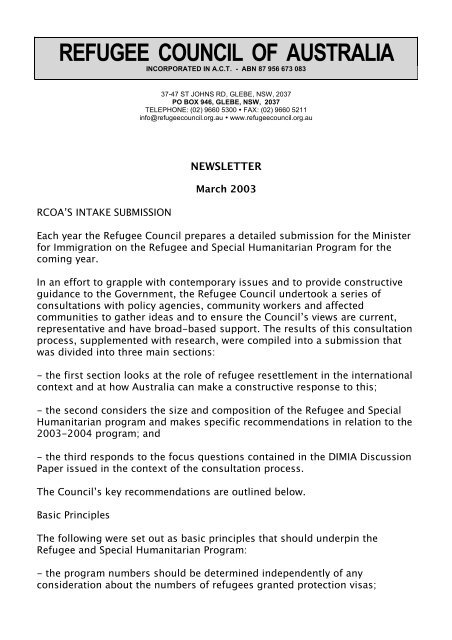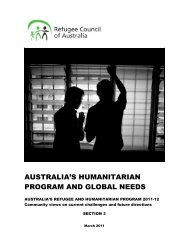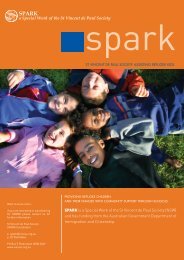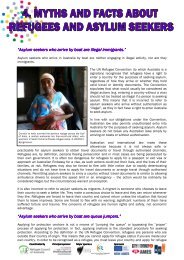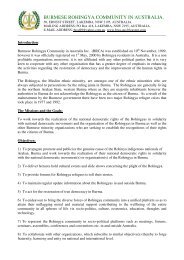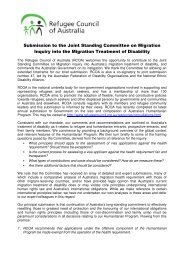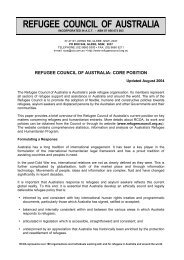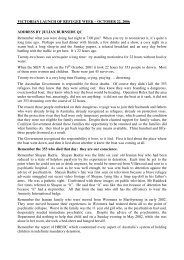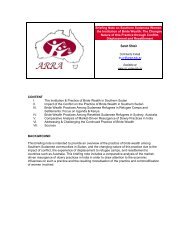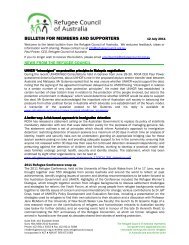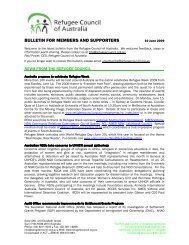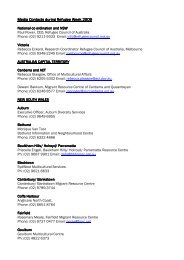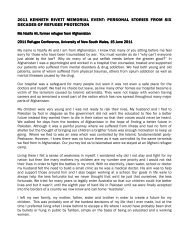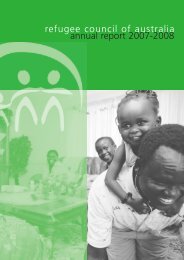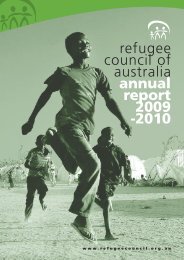REFUGEE COUNCIL OF AUSTRALIA
REFUGEE COUNCIL OF AUSTRALIA
REFUGEE COUNCIL OF AUSTRALIA
You also want an ePaper? Increase the reach of your titles
YUMPU automatically turns print PDFs into web optimized ePapers that Google loves.
<strong>REFUGEE</strong> <strong>COUNCIL</strong> <strong>OF</strong> <strong>AUSTRALIA</strong>INCORPORATED IN A.C.T. - ABN 87 956 673 08337-47 ST JOHNS RD, GLEBE, NSW, 2037PO BOX 946, GLEBE, NSW, 2037TELEPHONE: (02) 9660 5300 FAX: (02) 9660 5211info@refugeecouncil.org.au • www.refugeecouncil.org.auRCOA’S INTAKE SUBMISSIONNEWSLETTERMarch 2003Each year the Refugee Council prepares a detailed submission for the Ministerfor Immigration on the Refugee and Special Humanitarian Program for thecoming year.In an effort to grapple with contemporary issues and to provide constructiveguidance to the Government, the Refugee Council undertook a series ofconsultations with policy agencies, community workers and affectedcommunities to gather ideas and to ensure the Council’s views are current,representative and have broad-based support. The results of this consultationprocess, supplemented with research, were compiled into a submission thatwas divided into three main sections:- the first section looks at the role of refugee resettlement in the internationalcontext and at how Australia can make a constructive response to this;- the second considers the size and composition of the Refugee and SpecialHumanitarian program and makes specific recommendations in relation to the2003-2004 program; and- the third responds to the focus questions contained in the DIMIA DiscussionPaper issued in the context of the consultation process.The Council’s key recommendations are outlined below.Basic PrinciplesThe following were set out as basic principles that should underpin theRefugee and Special Humanitarian Program:- the program numbers should be determined independently of anyconsideration about the numbers of refugees granted protection visas;
- the size of the offshore program should be increased commensurate withthe role afforded to resettlement in UNHCR’s Agenda for Protection. Such anincrease should occur incrementally so as to allow the expansion of thecapacity of the essential settlement services;- 50% of the numbers should be devoted to the refugee component of theprogram;· 15% should be devoted to Women at Risk entrants;- all offshore refugee entrants should be granted permanent visas and be ableto gain access to all settlement services;- greater provision should be made for people displaced within their owncountry to be included within the humanitarian program;- there should be a separate program introduced in the family reunionprogram to target family members of humanitarian entrants;- the program should make provision for a contingency reserve.Size of the 2003-04 Refugee and Special Humanitarian ProgramThe following recommendations were made about the size of the program:- 12,000 new places be made available for offshore entrants in the 2003-04Program;- any unused visas be rolled over in the 2003-04 program;- 6,000 places be made available for the refugee component of the program;- for as long as the policy of issuing offshore temporary visas remains, thesevisas not be counted against the refugee component of the program;- at least 1,800 places be made available for Women at Risk entrants;- plans be made to increase the program size by 1,000 places each year tobring the program to 15,000 places;- a contingency reserve of 3,000 places be set aside to accommodate anymajor humanitarian emergency that necess-itates the opening up ofadditional resettlement places.In other words, the recommended program for the coming year would be asfollows:Refugee Program 6,000Special Humanitarian Program 6,000TOTAL 12,000
Contingency Reserve 3,000Regional Composition of the Program:It was recommended that the regional composition of the program be asfollows:Africa 43%Middle East 35%Europe 12%SE and South Asia 7%South America 3%Copies of the full submission can be obtained from the RCOA Secretariat.TPV UPDATETemporary Protection Visas (TPVs) were introduced in October 1999. Grantedto those determined to be refugees but who had entered withoutauthorisation, the TPVs were to last for 3 years, with re-processing tocommence after 30 months.It is now 39 months after the first visas were issued but as yet, no progresshas been made on assessment of the claims. The hold-up is the Minister forImmigration. He has yet to make a determination about how DIMIA officers areto consider the claims: will the onus be on the refugees to prove that they arestill refugees or on DIMIA to prove that they are no longer refugees?Meanwhile the wait and the uncertainty are taking a heavy toll on the refugeeswho hold TPVs, especially the Afghans who have no idea how their claims forprotection will be viewed in the post-Taliban environment and the Iraqis whohave concluded that the Government is simply waiting until after the war inIraq, at which time they will be forced to return.Groups around the country are rallying to provide support to the TPV holdersduring this difficult time to provide:· legal advice;· language training;· employment support;· access to education; etc.Contact the Refugee Council for details of initiatives near you or visit theTemporary Protection Visa section in the RCOA website.AFGHAN REINTEGRATION PACKAGE
On 16th December 2002, the Federal Government extended its Afghanreintegration package to cover Afghan refugees with a Temporary ProtectionVisa (TPV). The package includes a grant of $A2,000 per person, or up to$A10,000 for families, plus airfare, plus assistance (through IOM) on return.While some European states are offering repatriation packages to Afghans,they are offered to asylum seekers, not refugees. Australia appears to be theonly Western country to be offering a repatriation package to people who havebeen determined to be refugees.Over and above this point, the Refugee Council has a number of concernsabout the reintegration package, not least about the lack of consultation withthe community sector prior to the offer being extended, the timing of theoffer (before TPV reprocessing had commenced) and the lack of anyindependent advice available to TPV holders wishing to consider the package.The Refugee Council is currently preparing a position paper on this issue andit will be posted in the near future on the Council’s website.EAST TIMORESE UPDATERCOA welcomes efforts by the ALP to move an amendment to the MigrationLegis-lation Amendment (No.1) Bill which, if it passes through Parliament, willenable the Government to grant permanent residence to the approximately1650 East Timorese asylum seekers currently living in Australia.Most of the East Timorese have been in Australia for 8-10 years. Had theirclaims been processed when they came, there is every likelihood that theywould have been granted refugee status. Instead they were kept in a state oflegal limbo amidst arguments about who should take responsibility for theirprotection.With East Timor now an independent state, it can no longer be claimed thatthey fear persecution but most of the East Timorese have compelling reasonswhy they should remain. These are due in part to the strong links they havedeveloped in Australia and in part to the problems they would face returningafter so long away.RCOA is encouraging all political parties to support this importantamendment. Please see the media release on this topic.HIGH COURT DECISIONIn a landmark decision of the High Court on 4th February, all seven judgesthrew out Minister Ruddock's attempt to deny asylum seekers access to thecourts.
In legislation introduced in September 2001, the Government had attemptedto limit appeal in immigration matters to the administrative appeal bodies byinvoking a Privative Clause.The High Court, however, determined that applicants can still appeal to thecourts, not only to the High Court, but also to the Federal Court and the newFederal Magistrates' Court. They also concluded that the High Court, despiteattempts by the government to stop this practice, can still remit matters tolower courts to avoid the High Court being clogged.A commentary on the decision by Frank Brennan SJ AO (The High CourtThrows Out the Ruddock Attempt to Exclude the Courts in Refugee Cases) isavailable from Uniya on (02) 9356 3888.The Refugee Council also recommends that all migration agents seek legaladvice about the implications of the High Court Decision.FIELD VISIT TO PNGWith so much attention focused on developments in the Middle East, it is easyto forget that our nearest neighbour is grappling with a refugee problem of itsown.For almost 20 years Papua New Guinea (PNG) has provided sanctuary to some20,000 refugees and border crossers from West Papua, with small numbers ofnew arrivals entering on a regular basis.In January RCOA’s Director participated in an International Commission ofJurists delegation to PNG. The purpose of the visit was to look at the currentsituation of the West Papuans and their future prospects. The delegation of 6also included the Hon. Duncan Kerr QC MP (as delegation leader), JusticeElizabeth Evatt and Judge John O’Meally.The delegation visited Port Moresby, Kiunga (in Western Province) and Vanimo(on the north coast). In each place they met with PNG officials, representativesof the Catholic Church and members of the West Papuan community.The main issue identified was that of status. Only a small proportion of theWest Papuans have been granted any form of legal status in PNG and thatgranted to the majority has expired. This leaves the West Papuans vulnerable,especially as most have lost Indonesian citizenship per virtue of time spentout of the country.The delegation also had concerns about lack of access to basic services, inparticular health care and education, though noted that in many instances,local people were also not adequately served.
Of particular and immediate concern to Refugee Council is the fate of almost300 West Papuans who crossed into PNG in December 2000 after a flagraisingceremony in Jayapura. UNHCR-supervised screening determined themajority to have well founded fears of returning but the PNG Government’sreview process concluded that they were not Convention refugees. Anannouncement was made in early March that the group would be returned.RCOA has made representations, as have many other groups. At the time ofwriting, the fate of these West Papuans remains unclear.The full ICJ report on the mission is not yet available but a summary reportfrom RCOA is available on request from the Secretariat.DEVELOPMENTS IN EUROPELast year a record 110,000 asylum seekers sought protection in Great Britain.Pressure from the public has lead the UK Government to push for reform ofEuropean asylum policies – drawing on precedents that might appear familiarto Australians.Britain has just announced a plan to send all asylum seekers to Albania, thepoorest country in Europe. Here they will be housed in specially builtdetention centres while their claims are being processed. This will bediscussed with other EU states at a meeting in Brussels later in March.The plan is intended to stem the flow of asylum seekers to the UK and also toget around a recent High Court decision that prevented the Government fromrestricting the availability of state benefits to asylum seekers.Full details of the UK plan are not yet known. Who, for instance, will undertakestatus determination? What will happen to those determined to be refugees?Whatever the answers, it is certain that human rights groups will oppose theplan, not least in terms of its compliance with regional human rights law.Meanwhile the Council of Europe is also discussing a number of radical newplans, one of which, if adopted, will see refugees deported once it isdetermined that their countries of origin are “safe” for return, irrespective ofhow long they have been in Europe.Another will extend the use of the concept of exclusion and deny refugeestatus to those who have committed a 'cruel crime' with a political motive. Thedefinition of what such a crime might be is unclear. This has raised concernsthat people involved in groups such as the Zimbabwean opposition that arefighting repressive regimes, would be denied the right to claim asylum.Refugee groups and academics have come out strongly against the variousnew proposals. They have pointed, in particular, to lessons learnt in Australiaabout the harm that is done to refugees when they are not given the securityto rebuild their lives.
<strong>REFUGEE</strong> WELCOME ZONESMore and more Councils around the country are declaring themselves RefugeeWelcome Zones, an initiative of the Refugee Council of Australia. To date thereare 35 Refugee Welcome Zones. The following councils have signed on sinceSeptember 2002:In Victoria:Moonee ValleyWhittleseaMilduraIn NSW:LeichhardtAshfieldMarrickvilleWollongongSouth SydneyRockdaleKu-ring-gaiLake MacquarieIn SA:MitchamMurray Bridge CouncilIn WA:SubiacoIf you w ant information about how you can encourage your council to becomea Refugee Welcome Zone contact Jacki Dillon on (03) 9416 0044.RCOA’S NEW ADVOCACY KITThe Refugee Council is conscious that there are many new players in therefugee scene, brought on board by their concern about the direction ofAustralia’s refugee policies.We are only too well aware of what a complex area this is and how important itis to have a good understanding of the basic facts. We also know fromexperience that there are many traps for unwary players.For this reason, the Council developed a kit for advocates and communitygroups that contains:- information about refugees and asylum seekers and the refugee statusdetermination process;
- useful hints for those working with refugees and asylum seekers and forthose wishing to engage in advocacy;- guidance about the various complaint mechanisms that exist for people whofeel that things are not as they should be;- an annotated list of organisations that are working in the sector;- contact details of the various inter-agencies that people can join to get moreinformation and to link up with those who are working in the sector.The kit was initially developed for those in NSW so the contact details relate tothat state. RCOA is exploring the possibility of producing similar versions forother states (and if this is something you are interested in helping us with,please let us know).The Advocacy Kit will be available RCOA’s website soon.NEED TRAINING?Ever felt that you and your staff are working in a silo? Do you feel that youknow about the work that you are doing but not so much about how it fits intothe broader picture? Then there are all those questions you have never hadanyone to ask …Part of the Refugee Council’s role is to provide training to service providersand groups. RCOA can design training packages specifically to meet yourneeds on a wide range of refugee-related areas.Contact the RCOA Secretariat for more details.RCOA SAYS “THANK YOU”There are many organisations and people that have helped the Council inmany ways in recent months and to whom we would like to say thank:- to the staff and volunteers at SBS who worked so hard to make the radioappeal for the Refugee Council such a success;- to Moonlight Cinema for their benefit nights for the Council in Melbourne,Sydney and Adelaide;- to Circus Oz for donating 750 tickets for use by refugee and asylum seekerfamilies so that the kids could go to the circus;- to Chris Badman from the British Refugee Council who has been providinginvaluable assistance to RCOA while he has been in Australia;
- to all of the other volunteers at the Refugee Council who play such animportant role supplementing the work of the small group of paid staff.WHAT’S NEW?EVENTSDon’t forget to keep an eye on the RCOA website – www.refugeecouncil.org.au- for a regularly updated list of coming events.RESOURCESMigration Action: the December 2002 edition of this excellent publication is a“must read” for everyone with an interest in asylum policy. Under the theme“There is a Better Way” the volume contains articles by Paris Aristotle, StanciaVichie, Savitri Taylor, Marc Purcell, JAS and RCOA’s Jacki Dillon whichcollectively provide an excellent overview of the current state of play in thisarea. Contact EMC to order your copy.Linguistic Identification in the Determination of Nationality: a preliminaryreport by 5 senior linguists that raises serious doubts about the use oflinguistic analysis in refugee status determination. Contact Professor TimMcNamara: 0409 463 182.Social Alternatives: Vol. 21 no. 4: special edition on Asylum Seekers andRefugees. Produced by the University of Queensland. Contact Barbara Youngfor a copy.Settling In: A Group Program for Newly Arrived Refugee and Migrant Students:a kit designed for those working with newly arrived students from manybackgrounds. Available from STARTTS (02) 9794 1900.A Better State of Mental Health for All: a multilingual, multimedia communityawareness campaign promoting mental health and well being of children,adolescents, young people and families. Available from the TransculturalMental Health Centre.Refugees, Rebels and the Quest for Justice: explores the trio of obligationswhich collide when refugees are forced to flee in situations of armed conflict:refugees must be protected, the security of the host community must beassured and human rights violators must be held accountable. This LawyersCommittee for Human Rights report documents the results of a multi-yearresearch project on refugee law and security in Africa.European Journal of Migration and Law: is a quarterly publication on migrationlaw and policy with a specific emphasis on the European Union, the Council ofEurope and migration activities within the OSCE. It is an initiative of the Centre
for Migration Law at the University of Nijmegen in cooperation with theBrussels based Migration Policy Group. A sample copy can be viewed online.Publications about the United Nations: Kluwer Law International produces arange of publications about various aspects of the UN system including how tocomplain to the UN Human Rights Treaty System. For details about these andother publications contact KLI.AND IF YOU ARE LUCKY ENOUGH TO BE VISITING LONDON: check out theexhibition “Suitcases and Sanctuary” at the Immigration Museum in EastLondon which was recommended by an RCOA member.


